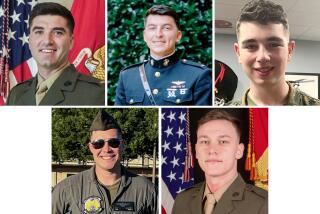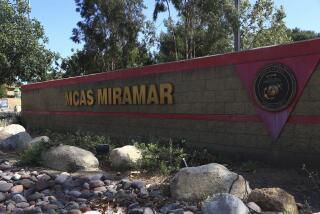WWII Marine Corps pilot
- Share via
James E. Swett, a former U.S. Marine Corps pilot who was awarded the Medal of Honor after shooting down seven Japanese bombers in 15 minutes over the Solomon Islands during World War II, died Sunday of congestive heart failure at Mercy Medical Center in Redding, Calif. He was 88.
On the morning of April 7, 1943, Swett, then a 22-year-old first lieutenant on his first combat mission, led his division of F4F-4 Wildcats to the skies over Guadalcanal in the western Pacific Ocean, where a wave of 150 Japanese bombers and fighter escorts was headed.
His Medal of Honor citation noted that Swett “unhesitatingly hurled his four-plane division into action,” engaging a formation of 15 Japanese aircraft and shooting down three planes in succession “with accurate and deadly fire.”
Despite being hit by friendly antiaircraft fire, Swett maintained control, swept behind a group of five enemy bombers, then attacked. He rapidly took out four and, although low on ammunition, closed in on the fifth. He drew near enough to see the face of the Japanese tail gunner, who fired on him, sending Swett and his Wildcat into Tulagi Harbor below.
His windscreen shattered, his nose broken and his plane crashed into the sea, Swett, now an ace, was scooped up by a U.S. patrol boat.
After a short period of recuperation, he began flying F4U Corsairs off aircraft carriers. In July 1943 he was shot down again by the Japanese near New Guinea. He spent four days in a rubber life raft, eating coconuts and chocolate bars before being rescued by natives.
Swett took part in more than 100 combat missions, including action at Iwo Jima and Okinawa.
By the time the war ended, he had more than 15 confirmed kills. He received not only the Medal of Honor, the military’s highest award for valor, but also the Distinguished Flying Cross, the Purple Heart and the Air Medal.
After he was released from active duty, he joined the reserves, retiring in 1970 as a colonel.
James Elms Swett was born June 15, 1920, in Seattle and raised in San Mateo, Calif. He learned to fly while enrolled in the Civilian Pilot Training Program at the College of San Mateo.
After Japan attacked Pearl Harbor on Dec. 7, 1941, Swett enlisted in the Navy, later switching to the Marine Corps.
When his military service ended, he returned to the San Francisco Bay Area and worked at his father’s industrial machinery and equipment business. Swett took over after his father died in 1960.
Swett retired in 1983, and he and his first wife, Lois, moved to Trinity Center, a small community northwest of Lake Shasta. She died in 1999, and he later remarried and moved to Redding.
His second wife, Verna, survives him, as do his sons, James Jr. and John, from his first marriage, both of whom joined the Marines; three grandchildren; and four great-grandchildren.
Swett was buried at the Northern California Veterans Cemetery near Igo, southwest of Redding.
--
More to Read
Sign up for Essential California
The most important California stories and recommendations in your inbox every morning.
You may occasionally receive promotional content from the Los Angeles Times.










